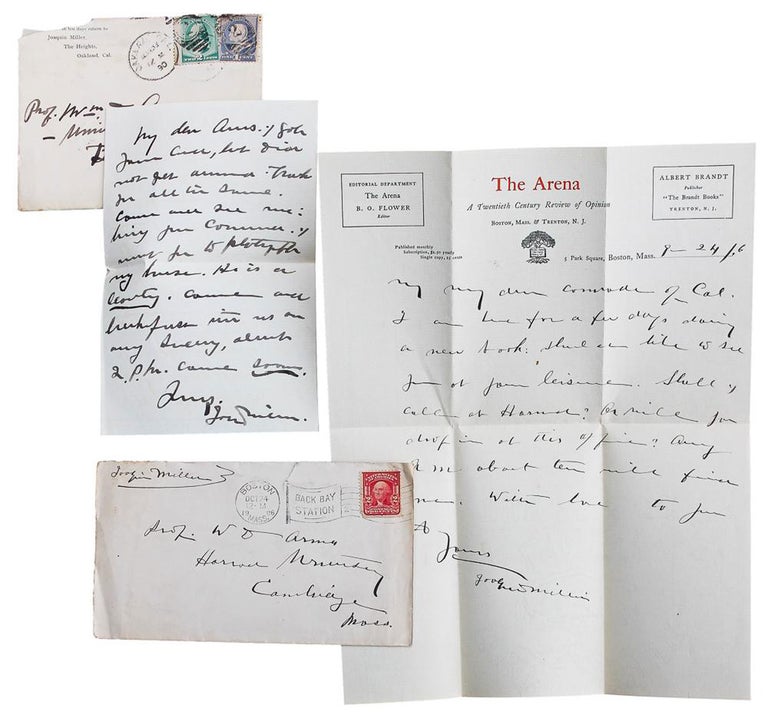Two handwritten notes to William D. Armes. Short notes arranging visits between Miller and Armes, the first written from Oakland, not dated, envelope postmarked 25 March 1890, the second written from Boston on an Arena letterhead dated 24 October 1906. Miller and Armes were longtime friends and fellow utopians. William Dallam Armes (1860-1918), an associate professor of English at the University of California, Berkeley, was a founding member of the Sierra Club and its first secretary. The flamboyant Joaquin Miller (1839-1913), born in Liberty, Indiana, moved with his family to Oregon in 1852. At about the age of seventeen Miller ran away to the Shasta region of Northern California where he lead a boisterous life among the Indians until he wisely returned to Oregon after the Pitt River massacre. Back in Oregon he taught school, was admitted to the bar in Portland, established a pony express route between Washington Territory and Idaho, purchased the Democratic Register in Eugene and became its editor, fought Indians, and published several collections of poetry (Specimens, 1868, and Joaquin, et al., by Cincinnatus H. Miller, 1869) which, in 1870, led him to San Francisco and its literary circle of Bret Harte, Charles Warren Stoddard and Ina Coolbrith. He then embarked on a literary pilgrimage to England where his Songs of the Sierras, published by Longmans in 1871, which "in spite of its cheap rhythms and Byronic imitations was loudly acclaimed by the British. Its reception in America was less favorable, critics refusing to accept its romanticism as a genuine expression of the Far West ... A brief visit to America convinced the poet of his unpopularity; he sought consolation in foreign travel. During the next few years he visited South America, Europe, and possibly the Near East" (DAB). Miller returned to America and, in 1886, settled permanently in California in the hills above Oakland. "For many years he was one of the landmarks of California. As a bearded sage and advocate of the simple life he was looked upon with a respect which was mingled with amusement at his eccentricities and horror at his theories of free love. In 1897-1898 he found renewed adventures as a correspondent of the New York Journal in the Klondike. By the time of his death in 1913 the West that he had loved had vanished. The best of his work remains of significance as an attempt, never wholly successful, to celebrate on a heroic scale its freedom and its beauty" (DAB). "Miller is neither subtle nor profound. He is the poet of rugged men and 'wide open spaces.' Much of his work is worthless. Yet the surge and sweep of poems like 'Columbus,' 'The Missouri' and a few others have seldom been equaled in American literature" (Fullerton). Miller should best be remembered for his Songs of the Sierras (1871), Life Amongst to Modocs (1873), considered by Stuart Sherman to be "his most interesting book," and his narrative poem Light (1907), his "last bid for fame" and "his closest approach to full maturity as a poet" (DAB). It is likely that Miller was working on Light in Boston when he wrote the 1906 note to Armes who was in Cambridge, Massachusetts, at the time. The usual folds for mailing, fine. (#166122).
Price: $250.00
"Coming Soon"


